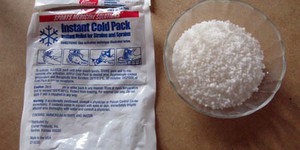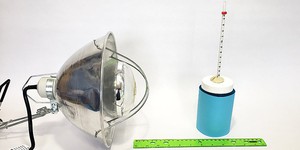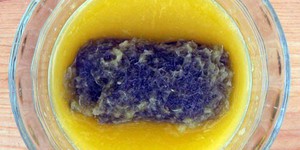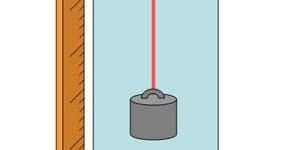Seventh Grade, Measure Temperature During an Experiment Science Projects (16 results)
Measure thermal properties (temperature) during a hands-on experiment. Measure and record temperature changes during a chemical reaction (making hand warmers), a life sciences model (bottles that are like huddled puppies), or physics experiment (stretching rubber bands).
|
Instant cold packs are popular with coaches and parents for treating minor bumps and bruises. The instant cold packs are not pre-cooled—you just squeeze the cold pack and its starts to get cold. So how does it work? In this chemistry science fair project, you will investigate the chemical reaction that occurs in instant cold packs.
Read more
Featured
Have you heard that garlic powder is supposed to inhibit the growth of bacteria? Which do you think would make a better disinfectant: a solution of garlic powder or a solution of bleach? This project shows you a straightforward way to compare the effectiveness of different disinfectants (or other antimicrobial agents), by measuring zones of inhibition on a culture plate.
Read more
Why is it more comfortable to wear light-colored clothes on a hot summer day? Why wear a dark-colored jacket for early-morning fishing on a cold lake? How much difference can it make? Here's a project where you can quantify how much difference color makes for absorbing heat.
Read more
New
Have you ever noticed that on a hot day, it's more comfortable to wear a light-colored shirt than a dark one? Or that it's cooler in a park than walking down a street? This happens because different surfaces absorb and reflect heat in different ways. Urban heat islands are parts of cities where man-made surfaces like pavement and buildings replace natural surfaces like grass and trees. In this project, you will use temperature and satellite data to see if certain areas in a city have higher…
Read more
Have you ever left your bike outside in the rain? If so, you might have discovered unpleasant surprises afterwards—reddish-brown patches, known as rust, and your wheels, brakes, and gears might have stopped working so smoothly. In this chemistry science fair project, you'll learn why rust, a type of corrosion, is a serious problem. You'll also discover that not all rains are the same! Find out which ones can speed up the rusting process.
Read more
So you've just finished mowing the lawn on a hot summer day, and you'd like a cold, refreshing drink as a reward. You look in the fridge, and oops! it's empty. The sodas are still sitting in the cupboard, at room temperature. What's the fastest way to get that soda down to a cold, drinkable temperature with materials readily at hand?
Read more
Many materials expand when heated and contract when cooled. What do you think will happen to the elasticity (stretchiness) of a rubber band when it is heated or cooled to various temperatures?
Read more
New
Engineers are trying to tackle the world's ocean pollution problem using robots. Some robots, like Mr. Trash Wheel and the ship featured in this Mark Rober video, are stationary and collect trash as it flows out of rivers before it gets into the ocean. Others, like the Jellyfishbot, are mobile and can squeeze into narrower spaces to collect trash:
Can you build and test your own trash-skimming robot? If you do not have access to a natural body of water to test it in, you can use a bathtub or a…
Read more
Expanding gases are everywhere, from the kitchen to the cosmos. You've tasted their pleasures every time you've eaten a slice of bread, bitten into a cookie, or sipped a glass of soda. In this chemistry science fair project, you'll capture a gas in a stretchy container you're probably pretty familiar with—a balloon. This will allow you to observe the gas expansion and contraction as the temperature changes.
Read more
Can water remain liquid below its normal freezing point? If it does, that water is supercool(-ed). This project shows you a method for supercooling water. You can test water from different sources to see whether or not it can be supercooled.
Read more
You've probably noticed that the price of gasoline has been going up and up lately. Heating oil will probably cost more this winter than last winter, too. Using good insulation material is one way to conserve energy and save money. What insulation materials work better than others?
Read more
When we get hot, we sweat. The physiological role of sweat is to cool us down. When the water evaporates, it removes energy from our bodies. This sort of evaporative cooling can also be used to cool homes, using what are referred to as swamp coolers. Evaporative cooling is also a potential source of energy waste in the kitchen because it increases the time it takes to heat water. In this chemistry science fair project, you will study how a variety of things cool down, whether for better or…
Read more
From the name, you might guess that a psychrometer is an instrument designed to measure your thoughts. Psych! Actually, it is an instrument that can help you forecast the weather. Read more to find out how it works.
Read more
|
Explore Our Science Videos
Light-Tracking Robot: BlueBot Project #2
Science Buddies: Hand Warmer Chemistry
Balloon Car: 2015 Engineering Challenge













